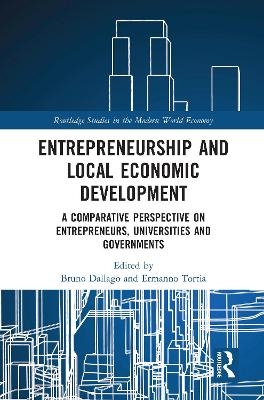
Entrepreneurship and Local Economic Development
Routledge (Verlag)
978-0-367-58618-8 (ISBN)
- Titel z.Zt. nicht lieferbar
- Versandkostenfrei innerhalb Deutschlands
- Auch auf Rechnung
- Verfügbarkeit in der Filiale vor Ort prüfen
- Artikel merken
This book focuses on the nature and role of entrepreneurship in modern developed and emerging economies and societies, its relation to governments and universities, and its role in the often-forgotten informal economy. The aim is to position entrepreneurship in the post-crisis context and explore how its relation to universities and governments contributes to explain the countries’ and territories’ growth performance and resilience or vulnerability to the crisis. The accent is particularly on processes and patterns at local level and in small and medium-sized enterprises in local economic systems and districts, local systems of innovation, and the types and configurations of innovation these give origin to.
With globalization, entrepreneurship has become fundamental for the competitiveness of territories and countries, for policy management and for development. The local dimension is fundamental because of agglomeration economies and effects, the advantages of proximity and the nature of knowledge and information. Furthermore, territories carry to the centre-stage tacit knowledge, localized social capital, embeddedness and interpersonal relations as fundamental components of their endogenous socio-economic development and competitiveness. When local systems are connected in a horizontal network, they contribute to the strength of national and international systems. To play a constructive role from this perspective, entrepreneurship must avoid local entrenchment and support the local economy to upgrade and be competitive. To do this, the entrepreneurs’ interaction and alliance with universities and governments is a must for those countries and localities wanting to emerge. This requires that enterprises, universities and governments create synergies and spill-overs to their mutual advantage.
Bruno Dallago is Full Professor of Economics at the University of Trento, Department of Economics and Management, Italy. Ermanno Tortia is Associate Professor of Economics at the University of Trento, Department of Economics and Management, Italy.
Introduction: entrepreneurs, universities and governments PART I Entrepreneurship and its frames 1 Entrepreneurship, the entrepreneur and the territory: an introduction 2 Are anchor institutions the answer to the prayers of small business owners in the UK? 3 Comparative analysis of innovation policy and market quality: lessons from Russia and Japan 4 Different types of informal entrepreneurs in fragile ‘transitional’ contexts: case-based evidence in Russia 5 Re-stimulating Chinese entrepreneurship through the mixed ownership reform 6 Determinants of the internationalization of Chinese enterprises: evidence from firm-level survey data 7 Managerial quality, business liberalization and corruption: the case of Turkey PART II Entrepreneurship, universities and governments 8 Innovation modes and knowledge relations: the learning match between university and enterprises from a regional perspective 9 Creative workers in Europe: is it a reserve of the ‘Would-Be Entrepreneurs’? A cross country comparison 10 Graduate entrepreneurship support: what higher education institutions do, and how government can support them. Lessons from Hungary and Ireland 11 The effect of government intervention on entrepreneurship: empirical evidence from China PART III The territory as context 12 The role of a local university in regional development: the case of Regensburg 13 Academic spin-offs and the innovative city: universities’ role in the entrepreneurial ecosystem of Boston 14 Native and immigrant entrepreneurship: costs of doing business and local liabilities Conclusion: the triple helix, social impacts and beyond
| Erscheinungsdatum | 01.07.2020 |
|---|---|
| Reihe/Serie | Routledge Studies in the Modern World Economy |
| Verlagsort | London |
| Sprache | englisch |
| Maße | 156 x 234 mm |
| Gewicht | 680 g |
| Themenwelt | Wirtschaft ► Betriebswirtschaft / Management ► Unternehmensführung / Management |
| Wirtschaft ► Volkswirtschaftslehre ► Makroökonomie | |
| ISBN-10 | 0-367-58618-5 / 0367586185 |
| ISBN-13 | 978-0-367-58618-8 / 9780367586188 |
| Zustand | Neuware |
| Haben Sie eine Frage zum Produkt? |
aus dem Bereich


